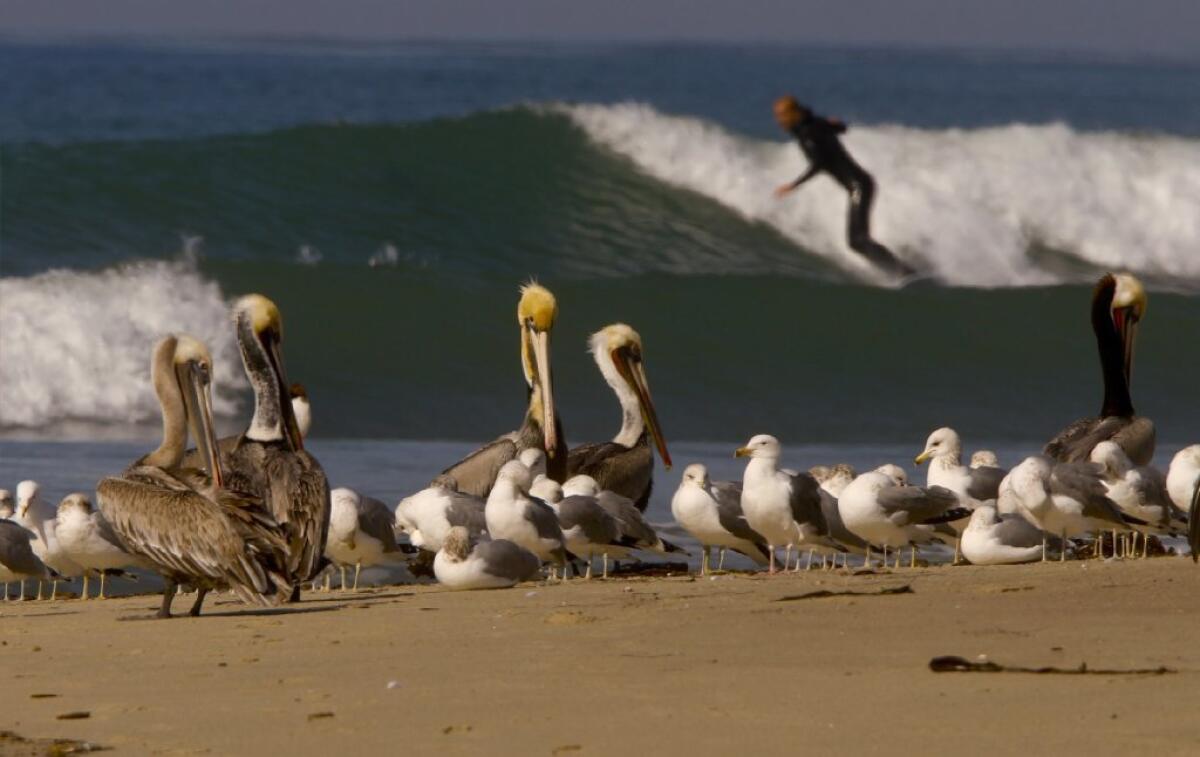Settlement ends the threat of a toll road through San Onofre State Beach

- Share via
Ending a long environmental battle, Orange County tollway officials agreed in a legal settlement Thursday to preserve San Onofre State Beach and withdraw their approval of a six-lane highway through the popular park.
The new agreement ends five lawsuits that targeted plans to lengthen the Foothill South toll road 16 miles to Interstate 5 in north San Diego County, using a portion of the state beach, which includes wildlife habitat, campgrounds, Indian sites and heavily used surf breaks, including Trestles.
The settlement also requires the Transportation Corridor Agencies in Irvine to rescind approval of the proposed 5½-mile Tesoro Extension, which environmentalists called a possible attempt to resurrect the route through San Onofre.
“This agreement will guarantee that millions of Californians will be able to enjoy this magnificent park, its beaches and natural areas for years to come,” said Elizabeth Goldstein, president of the California Parks Foundation and representative for the Save San Onofre Coalition, a group of 12 state and national environmental organizations.
Agency board members voted 10-2 to end the lawsuits brought in 2006 and 2011 by the state of California, the California Parks and Recreation Commission, the Native American Heritage Commission and the Save San Onofre Coalition.
The lawsuits claimed that the environmental impact reports for both projects were inadequate and that the Foothill South extension would damage valuable open space, a local land conservancy and one of the most popular parks in the state.
San Onofre has about 2.4 million visitors a year and provides habitat for 11 endangered and threatened species. The prospect of building a turnpike through the park sparked intense opposition from environmentalists, park users, surfers and several prominent state officials. Public hearings were often raucous and packed with hundreds of opponents and supporters of the project.
In February 2008, the California Coastal Commission rejected the route, a decision that was upheld later that year by the U.S. Department of Commerce. It has been assumed for years, however, that toll road officials could revive the project at some point.
The settlement will allow the corridor agency to consider a variety of transportation options, including a different Foothill South project, while protecting San Onofre, the San Mateo Creek watershed, the Richard and Donna O’Neill Conservancy and Indian sites, such as the ancient village of Panhe.
Under the agreement, the agency can assess the environmental impacts of alternate routes for connecting the Foothill tollway to I-5 that avoid San Onofre, valuable open space, wildlife habitat and culturally sensitive areas.
The settlement also calls for the agency to create a $28-million conservation fund that will help preserve the largely intact San Mateo Creek watershed that drains into the ocean at Trestles, one of the state’s best surfing spots.
“TCA and its team of experts have engaged in thoughtful and productive discussions about the future of improving transportation mobility and the importance of protecting environmentally sensitive areas,” said Mike Kraman, TCA’s chief executive officer. “This agreement is a baseline for achieving both of those objectives.”
Tollway officials have been reassessing the Tesoro project since April 2014 and reaching out to environmental groups, elected officials and community stakeholders for advice. They said they needed to address environmental concerns and that transportation projects were necessary to relieve increasing congestion on I-5 in south Orange County.
“Our coalition has sensed a change in tone and direction at the TCA in the past several years. This fresh look has allowed us to have constructive discussions about the project,” said Damon Nagami, a senior attorney with the Natural Resources Defense Council, a member of the Save San Onofre Coalition. “That has led us to where we are today.”
More to Read
Sign up for Essential California
The most important California stories and recommendations in your inbox every morning.
You may occasionally receive promotional content from the Los Angeles Times.











